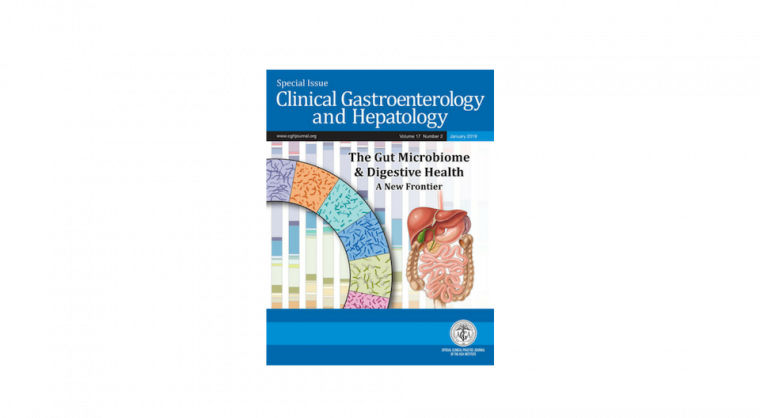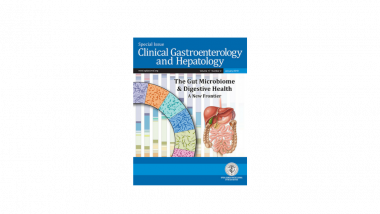Bethesda, MD (Jan. 3, 2019) — Research on the gut microbiome is one of the most promising areas of science today. In a new special issue of Clinical Gastroenterology and Hepatology, the American Gastroenterological Association (AGA) has taken the deep-dive into the gut microbiome that both scientists and the public are looking for to help them better understand the effects of the microbiome on health and disease. Clinical Gastroenterology and Hepatology is the clinical practice journal of the AGA.
Research published in the special issue, “The Gut Microbiome & Digestive Health – A New Frontier,” studies, analyzes and interprets gut microbiome data for clinicians, examines the possible role of the microbiome in digestive disease, and takes a robust look at microbiome-directed therapies for the past, present and future. Additionally, this issue provides a clinical context for translational and basic researchers engaged in the microbiome, facilitating further research that makes meaningful progress towards unravelling the mysteries of some of our most complex diseases and offers new therapeutic options that would allow us to safely and effectively improve patient outcomes.
Learn more about gut microbiome analytics and how the gut microbiome relates to aspects of nutrition, probiotics, the liver and gut-brain axis at www.gastro.org/microbiome. Clinical Gastroenterology and Hepatology also hosts a specially curated collection on the microbiome, through which you can stay abreast of the latest research published and sign up for alerts.
Visit the AGA Center for Gut Microbiome Research & Education for the latest in research and education and to learn more about the AGA’s NIH-funded Fecal Microbiota Transplantation (FMT) National Registry. AGA’s GI Patient Center also host specific patient-education pages written by AGA experts, on the related topics of probiotics and fecal microbiota transplantation, presented in an easy-to-read and easy-to-understand format for all patients.
Introduction to the issue
• The Gut Microbiome and Digestive Health – A New Frontier; by Ashwin N Ananthakrishnan, Amit G. Singal, Lin Chang
• Microbiome 101: Studying, Analyzing, and Interpreting Gut Microbiome Data for Clinicians; by Celeste Allaband, Daniel McDonald, Yoshiki Vázquez-Baeza, Jeremiah J. Minich, Anupriya Tripathi, David A. Brenner, Rohit Loomba, Larry Smarr, William J. Sandborn, Bernd Schnabl, Pieter Dorrestein, Amir Zarrinpar, Rob Knight
• Influence of Early Life, Diet and the Environment on the Microbiome; by Tien S. Dong, Arpana Gupta
Microbiome in specific diseases
• The Microbiome in Patients With Inflammatory Diseases; by Hari K. Somineni, Subra Kugathasan
• The Gut Microbiome in Adult and Pediatric Functional Gastrointestinal Disorders; by Andrea Shin, Geoffrey A. Preidis, Robert Shulman, Purna Kashyap
• Environmental Factors, Gut Microbiota, and Colorectal Cancer Prevention; by Mingyang Song, Andrew Chan
• The Gut Microbiome in Pancreatic Disease; by Venkata S. Akshintala, Rupjyoti Talukdar, Vikesh K. Singh, Mike Goggins
• Emerging Role of the Gut Microbiome in Nonalcoholic Fatty Liver Disease: From Composition to Function; by Suzanne R. Sharpton, V. Ajmera, Rohit Loomba
• Altered Microbiome in Patients With Cirrhosis and Complications; by Chathur Acharya, Jasmohan S. Bajaj
• The Gut-Brain Axis and the Microbiome: Mechanisms and Clinical Implications; by Vadim Osadchiy, Clair R. Martin, Emeran A. Mayer
Microbiome-directed therapies: past, present and future
• Prebiotics and Probiotics in Digestive Health; by Eamonn M. M. Quigley
• Nuts and Bolts of Fecal Microbiota Transplantation; by Edward Krajicek, Monika Fischer, Jessica R. Allegretti, Colleen R. Kelly
• Fecal Microbial Transplantation: Current Status in Treatment of GI and Liver Disease; by Byron P. Vaughn, Kevin M. Rank, Alexander Khoruts
###
About the AGA Institute
The American Gastroenterological Association (AGA) is the trusted voice of the GI community. Founded in 1897, AGA has grown to include more than 16,000 members from around the globe who are involved in all aspects of the science, practice and advancement of gastroenterology. https://www.gastro.org/.
About Clinical Gastroenterology and Hepatology
The mission of Clinical Gastroenterology and Hepatology is to provide readers with a broad spectrum of themes in clinical gastroenterology and hepatology. This monthly peer-reviewed journal includes original articles as well as scholarly reviews, with the goal that all articles published will be immediately relevant to the practice of gastroenterology and hepatology. For more information, visit www.cghjournal.org.
Like AGA and Clinical Gastroenterology and Hepatology on Facebook.
Follow us on Twitter @AmerGastroAssn, @AGA_CGH
Follow AGA on LinkedIn.
Watch our videos on YouTube.
Contact
Lucia Allen
[email protected]
301-272-1608













